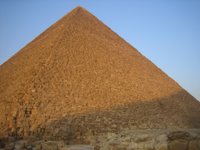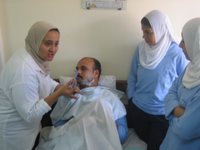The Wadi
Wadi Natroun: Literally it means the valley of salt, and for you arabic speakers who don't recognize the word 'natroun,' its because its not arabic:> its from the old coptic language that predated arabic in Egypt, and which also happens to be the language used in the mass liturgies of the Egyptian Coptic Churches. Take a pinch of the wadi's sand to your tongue and the first point about the name becomes clear, and in looking accross the Wadi valley at the four Coptic Monasteries the other point becomes clear. Stronghold may be a gross overstatement, but Wadi Natroun is one of the locational centers for the Coptic Christianity religious minority since the 4th century when Egyptian Christians fled to the desert to escape Roman persecution. It is surely the monastic center of Coptic Christianity, as even the Coptic Pope Shenuda himself comes from Deir Bishoi, the largest of the Coptic monasteries there.
I've been to the Wadi several times during my stay here in Egypt since the Iskander family (from Dr. Magda Iskander, the director of Care with Love and my volunteer facilitator) owns several pieces of land in the area being used by Care With Love in two ways: 1) During the 3-month home health care provider training, every class spends a 3-day spiritual retreat on the farm, and 2) a sister organization to CWL, Friends of Children With Cancer, is building on part of the farm the Health and Hope Oasis--a massive project creating a facility for kids with cancer to come between treatments to heal in the beautifully health-condusive environment of Wadi Natroun, including also a hospice. At the end of January I went on one of the CWL retreats, and yesterday I documented a volunteer workday at the H+HO.
CWL Retreat
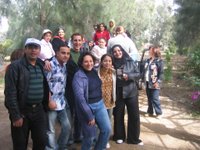
The departure time was 9 AM at the Ezbetinakhl office, which meant we left promptly at 9:30 (even I didn't arrive until 9:15). I had prepared a bag with a blanket and lots of reading material based on the fact that it was January in the northern desert of Egypt, and that I was going to be completely surrounded by Arabic for three days. It wasn't the arabic itself that bothered me so much as the mass of seminars and lectures for the students that were sure to give me some free time in the quiet of Wadi Natroun. But in staying true to my experience here in Egypt, nothing is ever as ou expect: neither was it quiet or free:>
I really underestimated what a trip this was for these trainees born and raised in Cairo, some never having travelled outside the city. It was really a time of celebration, and the initial bus-ride manifest this as I witnessed and necessarily partook in an impromptu and completely accapella time of singing, clapping, and even dancing (yes, its possible on a moving bus as long as you're on a straight highway). The excitement translated to pure energy upon arrival, as clean air and open spaces brought forth a flurry of activity, including games and races. It seemed that my idea of a vacation on a farm differed wildly from theirs, and I was glad because of it. Those three days I was reminded what it means to really live--to wake up early and go to bed late, to laugh and cry together, to cook and clean and play, to share and learn. I didn't open a single book, but boy was I glad I brought that blanket. A few highlights from the weekend...
--We Cairenes met the other class from Alexandria when we arrived--and surprise surprise!! 15 Muslims from Cairo and 6 Christians from Alexandria. Accordingly, the first meal saw 6 Alexandrians on one side of the table, and 15 Cairenes on the other. Thankfully, the trainers immediately displaced the unions and I didn't have to choose which side to sit on. And from that time forth, the groups began to mingle, though with some reserve, but mingling nonetheless.
--After a night of mos
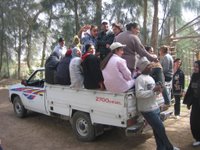 quito hell (where not only wrapping from head to foot in two blankets or my neighbor's flagrant snoring could keep them away), we all awoke to an early morning of riveting exercises. As I waited outside with the other guy trainees talking of the coming day's schedule, I began to notice some women I hadn't seen present the day before. Or wait, was that samah, and wafi, and seham without the higab (the traditional head-covering)?? Really, I almost didn't recognize them without the higab, as evidently the remote location away from parents, peers, and general society created an environment where the higab was unnecessary. In fact, many of the Muslim girls didn't wear it for three days, but as soon as we got on the bus to go home, guess what reappeared?? Sidenote about the higab--you know for quite some time before the 1980's, the higab was hard to find in Egypt?? Its only been a recent movement in which the higab has reappeared on the streets of Cairo. I've heard that the older generation of Islamic women has retired quite a liberal wardrobe replaced by more conservative coverings (ironically, though not an ounce of skin be showing, loose-fitting clothing is definitely not in style). The reasons for the resurgence in the higab vary depending on who you talk to/read. "The Koran says to," say some; for others its a matter of identity; other's talk of peer pressure; still other's talk of parent's orders. Regardless, it is a major islamic cultural element here in Egypt, as the rarer sight of a non-veiled woman generally means one of two things: 1) she comes from a wealthy Muslim family, or 2) she is Christian (which by no means rules out being rich).
quito hell (where not only wrapping from head to foot in two blankets or my neighbor's flagrant snoring could keep them away), we all awoke to an early morning of riveting exercises. As I waited outside with the other guy trainees talking of the coming day's schedule, I began to notice some women I hadn't seen present the day before. Or wait, was that samah, and wafi, and seham without the higab (the traditional head-covering)?? Really, I almost didn't recognize them without the higab, as evidently the remote location away from parents, peers, and general society created an environment where the higab was unnecessary. In fact, many of the Muslim girls didn't wear it for three days, but as soon as we got on the bus to go home, guess what reappeared?? Sidenote about the higab--you know for quite some time before the 1980's, the higab was hard to find in Egypt?? Its only been a recent movement in which the higab has reappeared on the streets of Cairo. I've heard that the older generation of Islamic women has retired quite a liberal wardrobe replaced by more conservative coverings (ironically, though not an ounce of skin be showing, loose-fitting clothing is definitely not in style). The reasons for the resurgence in the higab vary depending on who you talk to/read. "The Koran says to," say some; for others its a matter of identity; other's talk of peer pressure; still other's talk of parent's orders. Regardless, it is a major islamic cultural element here in Egypt, as the rarer sight of a non-veiled woman generally means one of two things: 1) she comes from a wealthy Muslim family, or 2) she is Christian (which by no means rules out being rich).--It surprised me when they told me we were going to the monestaries--all of us 20 or so Christians and Muslims in the lone pickup truck outside. Expert strategy made it work and we were on our way, any temporary discomfort absorbed by the latest round of songs and clapping. The weekend was certainly a 'spiritual retreat,' but outside of the institutionalized religion that divides people. It was a time to listen and think and share about the travels on life's road. And as potential caregivers, it was a time to meditate on making the "decision to love," both in the workplace and in the home. But after two days of solid relationship building, did we have to bring institutionalized religion back into the mix so soon?? The atmosphere was charged as we entered the first monestary--all were excited for our little tourist outing. After a short lecture on the history of Deyr Bishoi, a monk tour guide took us around the monastery, sharing some of the traditional stories associated with certain places, like the place where one of the monk's staff grew into a huge tree inside a building. After the tour, for the free time I followed all of the students back to the church, where together--Muslim and Chrisian--they prayed to St. Bishoi--a past monk who long ago, on an evening in which the monks were traveling to meet Christ in the desert, stopped to help an old and crippled man, sacrificing his chance to meet Christ. Or so they all thought, for the old man revealed himself as the Christ to St. Bishoi. As a man of such great spiritual discipline and example, the beloved Christian Egyptian monk (and others like him) are respected not only by Christians, but Muslims also as one in a long line of holy men seeking God. So for ten minutes the distinctions disappeared as all payed their respects, said a prayer, and even visited the giftshop for some of the famous Bishoi candles and holy oil.
So all in all, an incredible trip--so much learned about ourselves and each other. And as if the trip wasn't already good enough, I returned home with a basketful of fresh oranges and mandarins straight from the tree!!
Volunteer Day
The pre-understanding: 150 kids from a school in the rich part of Cairo aged 12-16 performing a day's worth of service on project in progress called the Health and Hope Oasis.
The translation: 4 buses full of 200 girls, aged 10-16 performing a half-day of service.
The finished product: Two half-mile lengths of road manually cleared and 200 bushes planted on the sides in six hours.
I've worked the landscap
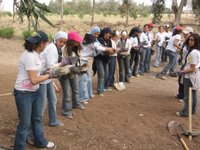 ing business the last two summers, and I'm not sure 200 professional landscapers could have finished what those girls did in that time. For what its worth, I came to find out that the group was the equivalent of what we call "Girl Scouts," and I was witness to impecable organization and maximum efficiency, which I must say was actually incredibly therapeutic after seven months here. Gloved with water at the waist, these girls expertly worked with shovels, axes, and hoes with such amazing enthusiasm--and though they didn't commit to just build the rest of the project, we did talk them into coming back in June for another day of service!!
ing business the last two summers, and I'm not sure 200 professional landscapers could have finished what those girls did in that time. For what its worth, I came to find out that the group was the equivalent of what we call "Girl Scouts," and I was witness to impecable organization and maximum efficiency, which I must say was actually incredibly therapeutic after seven months here. Gloved with water at the waist, these girls expertly worked with shovels, axes, and hoes with such amazing enthusiasm--and though they didn't commit to just build the rest of the project, we did talk them into coming back in June for another day of service!!

